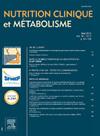医生对人工营养建议的认识
IF 0.4
4区 医学
Q4 ENDOCRINOLOGY & METABOLISM
引用次数: 0
摘要
目的营养学作为一个跨学科的领域,尽管与许多专业具有互补性,但有时很难完全融入日常医学实践。然而,它的处方仍然不一致,缺乏对各种形式的人工营养的知识或掌握会妨碍它们的适当使用。本研究旨在评估医生对目前人工营养建议的了解程度。方法对46名参与成人患者营养管理的外围医院中心医生进行调查。参与者回答了四个开放式问题,旨在探索他们对当前人工营养指南的了解程度。结果最新的建议与医生的知识之间存在显著差距,这可能有助于解释适当营养支持的处方不足。虽然口服、肠内和肠外营养通常是众所周知的,但应答者报告的一些禁忌症并没有得到现行指南的支持。预防原则、病人拒绝和技术困难经常被认为是处方的障碍。肠内营养优于肠外营养,是首选的一线治疗方法,但由于负面认知(疼痛、不适、耻辱),肠内营养有时会被推迟。此外,社会和技术因素导致不愿肠内营养,导致肠外营养的使用,有时是不适当的。结论:该调查强调了建议与临床实践之间的差距,强调了在整个护理途径中进行临床营养理论和实践培训的重要性。明确适应症,改善与患者的沟通,开发决策支持工具可以提高营养处方的相关性。定期的营养培训将有助于使医疗实践与现行指南保持一致,优化对营养不良患者的管理,并减少相关并发症。这个问题涉及临床、伦理和医学经济。本文章由计算机程序翻译,如有差异,请以英文原文为准。
Connaissances des recommandations de nutrition artificielle par les médecins
Objective
Nutrition, as a cross-disciplinary field, is sometimes difficult to fully integrate into daily medical practice, despite its complementarity with many specialties. Nevertheless, its prescription remains inconsistent, and a lack of knowledge or mastery of the various forms of artificial nutrition can hinder their appropriate use. This study aims to assess medical doctor's level of knowledge regarding current recommendations on artificial nutrition.
Methods
The study was conducted among 46 medical doctor at a peripheral hospital center involved in the nutritional management of adult patients. Participants answered four open-ended questions designed to explore their knowledge of current guidelines on artificial nutrition.
Results
The findings reveal a significant gap between the most recent recommendations and medical doctor’ knowledge, which may help explain the underprescription of appropriate nutritional support. Although oral, enteral, and parenteral nutrition are generally well known, some contraindications reported by respondents are not supported by current guidelines. The precautionary principle, patient refusal, and technical difficulties are frequently cited as barriers to prescription. Enteral nutrition is preferred as the first-line approach over parenteral nutrition, but its initiation is sometimes delayed due to negative perceptions (pain, discomfort, stigma). Additionally, social and technical factors contribute to a reluctance toward enteral nutrition, leading to the use of parenteral nutrition, sometimes inappropriately.
Conclusion
This survey highlights a gap between recommendations and clinical practice, underlining the importance of ongoing theoretical and practical training in clinical nutrition throughout the care pathway. Clarifying indications, improving communication with patients, and developing decision-support tools could enhance the relevance of nutritional prescriptions. Regular training in nutrition would help align medical practices with current guidelines, optimize the management of malnourished patients, and reduce associated complications. The issue is clinical, ethical, and medico-economic.
求助全文
通过发布文献求助,成功后即可免费获取论文全文。
去求助
来源期刊

Nutrition Clinique et Metabolisme
医学-内分泌学与代谢
CiteScore
0.80
自引率
16.70%
发文量
216
审稿时长
78 days
期刊介绍:
Nutrition Clinique et Métabolisme is the journal of the French-speaking Society of Enteral and Parenteral Nutrition. Associating clinicians, biologists, pharmacists, and fundamentalists, the articles presented in the journal concern man and animals, and deal with organs and cells. The goal is a better understanding of the effects of artificial nutrition and human metabolism. Original articles, general reviews, update articles, technical notes and communications are published, as well as editorials and case reports.
 求助内容:
求助内容: 应助结果提醒方式:
应助结果提醒方式:


